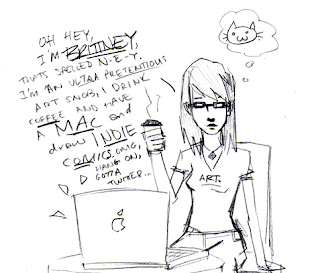What’s black, white, red all over and
inconclusive? MY DISSERTATION
I’m sitting in a
silent working area on campus. I’ve had the five disparate and red-streaked
documents that currently make up my dissertation open for about 45 minutes. I am
fidgeting on my swivel chair and listening to The Wonder Stuff while reading an interesting section on the Guardian website called GenerationY which focusses on graduate unemployment and money saving.
A girl sits down at
the desk next to me. Naturally my eyes are immediately drawn to her computer
screen instead of mine, and glancing over, I witness something extraordinary.
The first window she opens is not Twitter, or Spotify or her emails. It’s not
even the internet. It’s her work. Pages and pages of writing and journal
articles. Five minutes at her desk and she’s in the zone. Staring at her
screen, typing away. I look at her distrustfully for a couple of moments,
unsure if I’m jealous or actively judging this girl for her dedication to her
studies. ‘Swot’ the –rather large – section of my brain that still feels about
15 says.
 |
| No matter how long I look at it, the red bits never go away |
I sometimes wonder
whether I’m hard-working or not. My flatmate used the word to describe me
recently, and I was greatly taken aback. I briefly became slightly neurotic
about the concept, trying to identify precisely what makes one a hard-working
student. What actions of mine had led her to the conclusion that I, Siobhan haven’t-finished-a-book-all-year
Palmer, am hard-working? What constitutes ‘working hard’, or ‘working hard’
enough? Hours spent in the library? Not taking a break to watch the Dancing on
Ice final? What level of anti-social study is necessary to justify my position
as full-time student?
I am constantly faced
with two opposing angles on how ‘hard’ undergraduate study is. Many of my uni
friends are experiencing high levels of stress, putting their degree (and the
right classification) above anything else. And I suppose it is technically our
profession. But is comparing university education with full time work really
useful? Many ‘hard-working’ friends of mine seem to be living by the principle
that we can have social-lives, alcohol, relationships after our course ends. I can't help worrying that that kind of outlook will leave us feeling drastically conned come summer. Isn't the world of employment where control over our own time
stops?
When I leave the
student bubble, go home to my job as a barmaid and explain to the locals what
I’m doing with my life, I'm given the impression that uni is actually akin to ‘time
off’. My chance to socialize and have fun before joining the real world. A
holiday. People make jokes about daytime tv and long holidays and I laugh along and tell them my English degree consists of between 4 and 6 hours of lectures a week. But I worry about what's genuinely valued more, earning money pulling pints, or using loans to finance a degree from a Russell Group uni. My older coworkers reminisce about that time they started their
dissertation the week before the deadline and spent three straight days in a
pub. They never recall stress and hardship, like their degree was the pinnacle
of their intellectual existence. So what am I doing right now? I’m comfortably
passing my degree, but what is that? Am I working hard or having fun?
We seem to define everything in relation to
some sort of absolute, like working hard is something you are, not something you do. And this absolute is generally
connected to a job or the world of work. ‘The real world’ gives us a standard by which to measure how hard we are
working: our earnings. The supposed logic is if you’re making £40,000 a year,
you must be working hard because you have money to show for it. Maybe that’s
why I seem to have no idea how ‘hard’ I’m working towards this degree. I have
no direct, correlative measure of that work. I can’t be fired from study. My
intelligence and ability can only really be measured against myself. And it’s
blindingly obvious that just because I achieved a 2:1 in an essay does not necessarily mean
I worked ‘hard enough’. It’s strange that the equivalent, that a 40k salary
doesn’t automatically speak for how hard you work, is not so obvious a fact.
There’s no objective
measure for ‘hard work’, in any context. In the student environment,
this makes many people neurotic and anxious, because there’s no limit on what
you can or can’t be doing. No compulsory working day to fit your study into, or
even an official purpose or end-point for what we might be trying to achieve.
The fact that the main word attached to graduates these days seems to be
‘unemployment’ speaks to this.
It’s a pervasive idea that hardworking is a state of being rather than an action, and
this grates on me slightly, especially when it's attached or detached from whole sections of society, like students or bingo players. I think it’s a dangerous notion by which to measure
yourself as a person. I turn off The Wonder Stuff. And turn on The Fall. I suppose the answer to whether these are the days I worked really hard or had the most fun ever can only be arrived at in retrospect.While I read about youth disengagement and how to eat on
a budget, is whether I’m sufficiently justifying my 4 year stint in higher
education through library hours really the biggest of my worries? I shouldn’t
have to treat my degree like a full-time job. In a few months’ time, employers
sure as hell won’t.
 |
| In a few months time I'll be one of these. If I get my dissertation done and stop writing blogs. |







